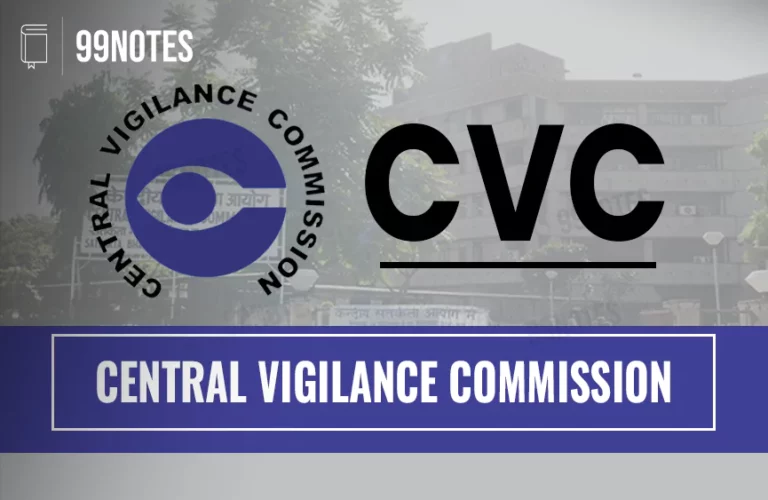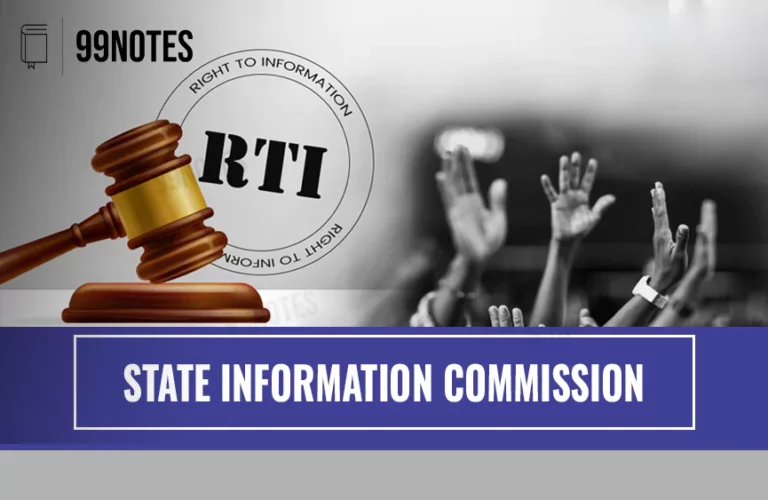Central Information Commission (CIC) in India- UPSC Notes
“Where a society has chosen to accept democracy as its creedal faith, it is elementary that the citizens ought to know what their government is doing”.
~Justice P N Bhagwati
Transparency and accountability in governance are essential elements of a participatory democracy. Lack of relevant information hinders citizens from engaging in discussions related to the social, political, or economic matters affecting the country. However, until 2005, the citizens in India had no access to information as a matter of right related to public authorities.
Even though the right to information is implicit in Article 19(1) (a) of the Indian Constitution, it was restricted by the Official Secrets Act 1923.
In such a scenario, the judiciary played an active role in several judicial pronouncements, such as SP Gupta Vs Union of India and Prabhu Dutt Vs Union of India; the court held that citizens have the right to know about the functioning of the government, as part of freedom of the press.
These judicial pronouncements compelled the government of India to come up with the Freedom of Information Act 2002. However, due to several restrictions, the act failed to achieve its objectives. Ultimately, this act was replaced by the Right to Information Act 2005.
Central Information Commission
The Central Information Commission is a non-constitutional statutory body established under section 12 (1) Right to Information Act, 2005. It has been mandated to act upon the complaints and appeals concerning offices, financial institutions, and Public sector undertakings under the central government and the Union territories.
The Commission is also entrusted with the duty of monitoring the public authorities and sending reports to the Parliament about the implementation of the provisions of the act. It also has the authority to provide recommendations about the efficient working of the act.
Composition of Central Information Commission
Section 12 (2) of the act provides for the Chief Information Commissioner (CIC) and not more than 10 central information commissioners.
Qualification of members of Central Information Commission
The Chief Information Commissioner and information commissioners should be a person of eminence in public life, possessing extensive knowledge and expertise in fields such as law, science and technology, social service, management, journalism, mass media, or administration and governance.
Further, the chief information commissioner and information commissioner should not be an MP or MLA of any state or union territory or, hold any other office of profit or related to any political party or carrying any business or profession.
Appointment of Central Information Commission
The President appoints the chief information commissioner and other information commissioner on the recommendation of a selection committee consisting of:
- The Prime Minister (Chairperson of the selection committee);
- The leader of the opposition (LoP) of the Lok Sabha and
- A Union Minister (nominated by the PM)
Note: Where the leader of the opposition is not recognized as such, the leader of the single largest party in the lower house will be deemed as the leader of the opposition in the Lok Sabha.
Service Conditions of the CIC and ICs
In 2019, the central government changed the service conditions of the CIC and ICs by amending section 13 of the Right to Information Act, 2005. Here is the comparison of the earlier service condition with the existing one.
| RTI Act, 2005 | RTI (Amendment) Act, 2019 | |
| Term | The Chief Information Commissioner (CIC) and Information Commissioners (ICs) at the central level will hold office for a period of 5 years or up to the age of 65 years, whichever is earlier. | The act repealed this provision and authorised the central government to determine the terms of office of the CIC and ICs. As per rules notified under this act, the central and state CIC and ICs hold office for a period of 3 years from the date of entering the office. |
| Pay | The salaries of the CIC and ICs will be equivalent to the salaries paid to the Chief Election Commissioner and Election Commissioners, respectively. | The act repealed this provision and authorised the central government to determine the salary, allowances and other service conditions of the central and state CIC and ICs. As per notified rules, the salary of the CIC has been fixed at ₹2.5 lakhs per month and of the ICs at 2.25 lakhs per month.
Note: The salary and allowances of the CIC and ICs cannot be varied to their disadvantage during service. |
| Reappointment | The CIC is not eligible for reappointment; however, ICs can be appointed as CIC (but maximum duration, including their term, as IC cannot exceed 5 years).
Note: They are not barred from taking up employment under Union or state government upon retiring from the office |
-No change- |
Removal of the CIC or ICs
As per section 14 (1) of the RTI Act, the chief information commissioner and other information commissioners can be removed only on the order of the President on the grounds of proved misbehaviour or incapacity after the Supreme Court (on the reference made by the President) holds an enquiry and upholds the charges made and advises so.
Note: If the Chief Information Commissioner or an Information Commissioner is involved or has a vested interest in any government contract, agreement, or benefits resulting from it, except as a member of an incorporated company, it is considered as misbehaviour for the purposes of section 14 (1).
Additionally, the President may order the removal of the CIC and ICs in the following circumstances:
- If s/he is adjudged an insolvent;
- Has been convicted of an offence which, in the opinion of the President, qualifies as moral turpitude;
- Takes on any paid employment outside of their official responsibilities while serving in office;
- Is, in the opinion of the President of India, unfit to continue in office by reason of infirmity of mind or body;
- Has acquired such financial or other interest that might adversely affect his/her role as the Chief Information Commissioner or an Information Commissioner.
Suspension of the CIC or ICs
Section 14 (2) of the Right to Information Act, 2005 empowers the President of India to suspend the CIC and ICs from office and, if deemed necessary, also to prohibit them from office during the enquiry [regarding misbehaviour and incapacity].
However, during suspension, s/he shall be entitled to the pay and allowances, i.e., subsistence allowance as allowed to a Government servant during the period of suspension, subject to the final order to be passed after the inquiry.
Power and Functions of Central Information Commission (CIC) and ICs
1. Power to receive and enquire into complaints:
Section 18 (1) of the RTI Act empowers the CIC to receive and inquire into a complaint from any person in the following circumstances:
- When an appellant is unable to submit the RTI application due to non-appointment of a Public information officer (PIO) or Assistant Public information officer (APIO) or if they refuse to take the RTI application.
- When the PIO denies the information.
- When the information has not been provided within the time limit.
- If a fee exceeding the amount specified in the rules is being charged.
- When an appellant has been given partial, misleading or false information.
- In any other situation, such as non-compliance with Section 4 of the RTI Act.
2. Power to take Suo-moto cognisance:
The Commission can order an investigation into any matter if there are reasonable grounds.
3. Power of a civil court:
The Central Information Commission have the same authority granted to a civil court while trying a suit under the Code of Civil Procedure, 1908, in the matters given below:
- Summoning and enforcing the attendance of persons and requiring them to give oral or written evidence under oath and to produce the documents or other items;
- Requiring the discovery and inspection of documents;
- Receiving evidence on affidavit;
- Requiring any public record or copies from any court or office;
- Issuing summons to have witnesses or documents examined;
- Any other matter that may be prescribed.
4. Power to Access to public record:
Any record that is under the control of the public authority and to which the act applies may be examined by the Commission during the investigation of any complaint made under this act; no such record may be withheld from it for any reason.
5. Power to secure compliance:
The Commission can require the public authority to take any such steps as may be required to ensure adherence with the provisions of this act, such as:
- By appointing a Central Public Information Officer (CPIO) or State Public Information Officer (SPIO), as the case may be;
- By publishing certain information;
- By making required changes to its practices in relation to the maintenance, management and disposal of records;
- By improving the way in which its officials receive training on the right to information;
- By providing it with an annual report.
6. Power to impose penalty:
- The Commission is responsible for the effective implementation of the RTI Act; hence, it has been conferred the power to impose penalties after giving the PIO an opportunity to defend himself or herself.
- The penalty can be imposed in the circumstances when the PIO has:
-
- Refuse to receive an application for information;
- Has not provided the information within the specified time period;
- Malafide denial of a request for information;
- Intentionally given incorrect, incomplete or misleading information,
- Destroyed the information, which was the subject of the request for information or hindered in any manner in furnishing the information.
- The amount of penalty is ₹250 per day until the information is provided, subject to a maximum cap of ₹25000.
- In case of continuous non-compliance, the Commission may recommend disciplinary action against the officer concerned. However, the decision to initiate action lies on the public authority as per the applicable service rules.
7. Power to provide compensation
The Commission can ask the public authority to compensate the complainant for any loss or harm.
- The Commission has the power to reject the application as well.
- Power of Monitoring and Reporting: As per section 25 of the RTI Act, the CIC exercises jurisdiction over all central public authorities. The provision mandates the public authorities to submit quarterly returns to the Commission.
- Annual Report: The Commission submits an annual report to the Union government regarding the implementation of the provisions of the act. The government then places this before the Parliament.
Meaning of “Public Authority” under RTI Act, 2005 |
| Any authority, body or institution of self-government constituted by:
a) Or under the Constitution b) Any other law made by Parliament c) Any other law made by the state legislature d) Any other body notified by the appropriate government, which is:
Note: Appropriate government means (a) Central government or any other public authority owned, controlled or substantially financed by the central government; (b) State government or any public authority owned, controlled or substantially financed by the state government. |
Appellate Jurisdiction of the Central Information Commission
1. First Appeal: Section 19 of the act provides that if a person does not receive a decision within the stipulated time or is dissatisfied with the decision made by the Central Public Information Officer, S/he has the right to file a first appeal. This appeal must be submitted within 30 days from the expiration of the specified period or from the date of receiving the decision. The appeal should be made to an officer who holds a higher rank than the Central Public Information Officer.
Note 1: The appeal can be considered even after 30 days if the officer is satisfied with the explanation of the appellant.
Note 2: The appeal can be filed by a third party as well; however, in that case, the appeal must be filed within 30 days.
-
- Disposal of First Appeal: The appeal must be disposed of within 30 days of the filing or within an extended period not more than 45 days from the filing of the appeal.
2. Second Appeal: If the appellant is not satisfied, s/he can file a second appeal before the Commission within 90 days of the decision of the first appeal [the Commission may consider the appeal even after 90 days].
-
- Disposal of second appeal: There is no time limit fixed for the disposal of the second appeal.
The decision of the Commission is final, and further appeal lies with the judiciary.
RTI (Amendment) Act, 2019 |
|
Constraints in the working of the Central Information Commissioners
- Dependency on government for funds and infrastructural support: Though established as an independent institution, the Commission depends on the government for funds, functionaries and other infrastructural support.
- Vacancies in the information commission: There is a huge pendency of complaints and appeals, resulting in delays in the disposal of cases. This can be primarily attributed to the failure of the central and state governments to timely fill the vacancies of the information commissioners.
Note: Currently, there are nearly 3.15 lakh cases pending before the commissions across the country. As per the report of Satark Nagrik Sangathan (October 2023), out of 29 ICs in the country, 5 are functioning without a CIC, and in four commissions, all IC posts, including the CIC, are pending.
- Background of the ICs: Most of the Information Commissions are headed by retired civil servants, particularly from the Indian Administrative Service. The representation of women as ICs is also very low (a mere 10%). For effective implementation, the Commission needs to be better balanced in terms of gender parity and inclusion of experts and professionals from various fields).
- Non-Compliance: Many times, the orders of the Information Commission are not implemented by the Public Information officers, and even penalties that are imposed are not recovered. Many of the commissions lack mechanisms to effectively monitor and enforce compliance.
- Reluctance in imposing penalties: The power to impose penalties has been given to the Commission as a deterrence value; however, it has been observed that the Commission has been extremely reluctant to impose penalties on erring officials. As per the report of Satark Nagrik Sangathan, for the period January 1, 2018, to March 31, 2019, 25 commissions-imposed penalties in 1.08% of the disposed cases.
Way Forward:
On the government’s part, it should be ensured that the Commission does not face a resource crunch in terms of human resources and other infrastructural support.
- The government should facilitate ICT tools as a transparency measure and for speedy disposal of pending cases.
- Best practices of one Information commissions should be replicated in other places.
Thus, a comprehensive approach that involves adherence to the act, resource support, technological intervention, and ensuring the autonomy of the institution is essential for the effective functioning of the Central and Information Commission.
In conclusion, the effective functioning of the Central Information Commission hinges on the implementation of the provisions outlined in the act in letter and spirit.

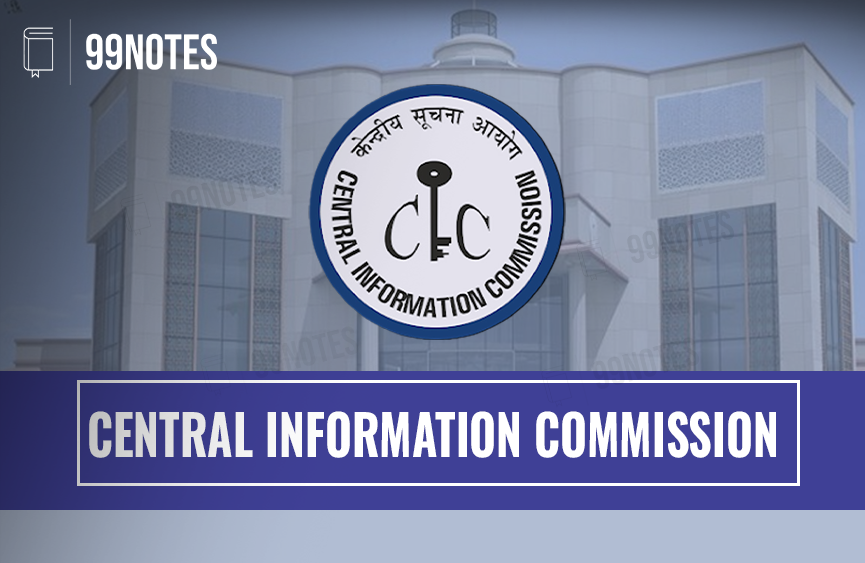

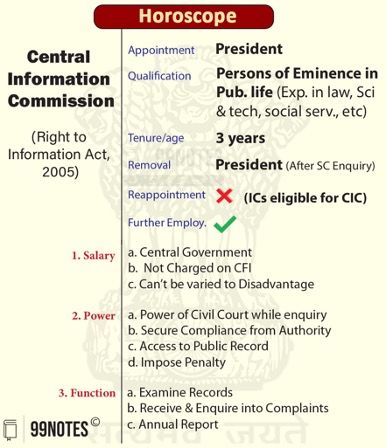
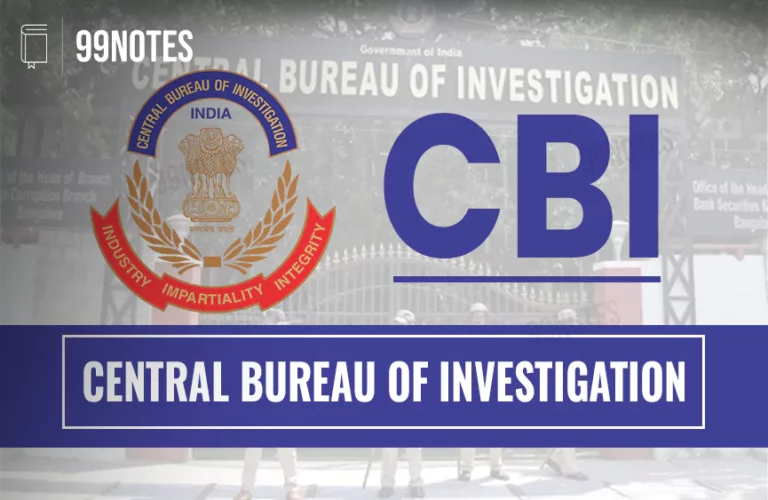

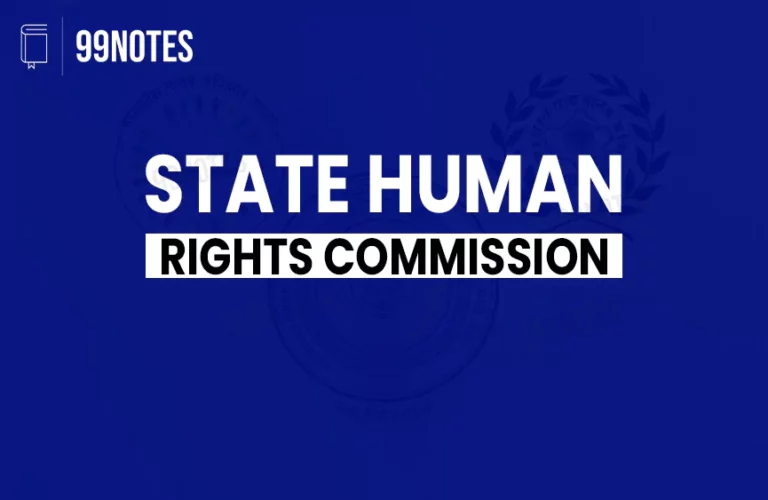
![National Human Rights Commission (Nhrc) [Upsc Notes] | Updated July 27, 2024 National Human Rights Commission (Nhrc) [Upsc Notes]](https://99notes.in/wp-content/uploads/2024/01/national-human-rights-commision-featured-667168d64d9c6-768x500.webp)
